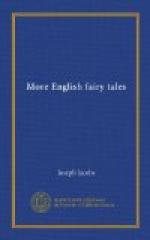Of these, thirty-eight are maerchen proper, i.e., tales with definite plot and evolution; ten are sagas or legends locating romantic stories in definite localities; no less than nineteen are drolls or comic anecdotes; four are cumulative stories: six beast tales; while ten are merely ingenious nonsense tales put together in such a form as to amuse children. The preponderance of the comic element is marked, and it is clear that humour is a characteristic of the English folk. The legends are not of a very romantic kind, and the maerchen are often humorous in character. So that a certain air of unromance is given by such a collection as that we are here considering. The English folk-muse wears homespun and plods afoot, albeit with a cheerful smile and a steady gaze.
Some of this effect is produced by the manner in which the tales are told. The colloquial manner rarely rises to the dignified, and the essence of the folk-tale manner in English is colloquial. The opening formulae are varied enough, but none of them has much play of fancy. “Once upon a time and a very good time it was, though it wasn’t in my time nor in your time nor in any one else’s time,” is effective enough for a fairy epoch, and is common, according to Mayhew (London Labour. iii.), among tramps. We have the rhyming formula:
Once upon a time when
pigs spoke rhyme,
And monkeys chewed tobacco,
And hens took snuff
to make them tough,
And ducks went quack,
quack, quack Oh!
on which I have variants not so refined. Some stories start off without any preliminary formula, or with a simple “Well, there was once a ——“. A Scotch formula reported by Mrs. Balfour runs, “Once on a time when a’ muckle folk were wee and a’ lees were true,” while Mr. Lang gives us “There was a king and a queen as mony ane’s been, few have we seen and as few may we see.” Endings of stories are even less varied. “So they married and lived happy ever afterwards,” comes from folk-tales, not from novels. “All went well that didn’t go ill,” is a somewhat cynical formula given by Mrs. Balfour, while the Scotch have “they lived happy and died happy, and never drank out of a dry cappie.”




